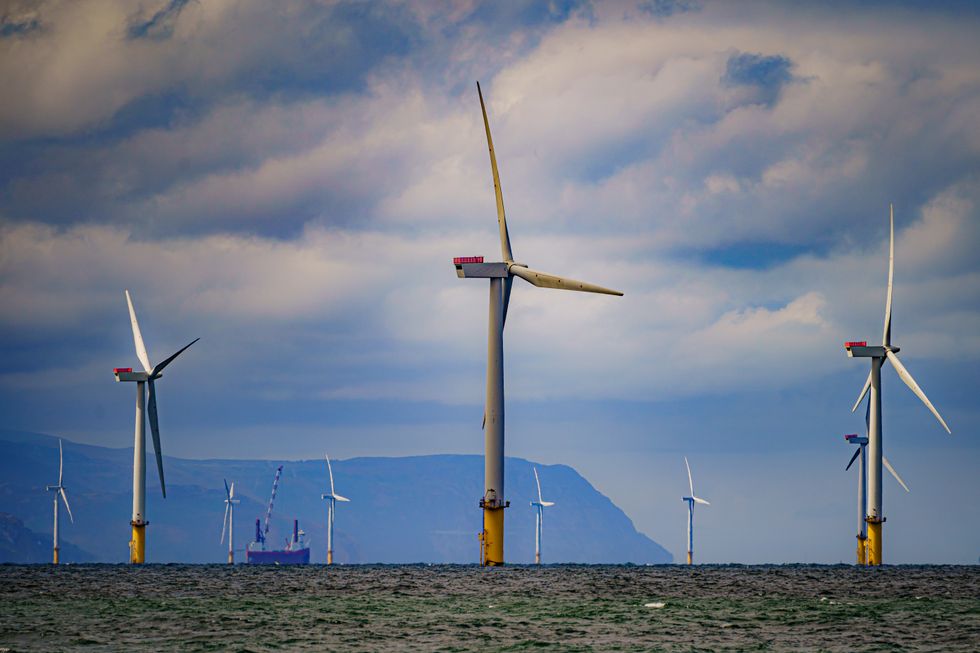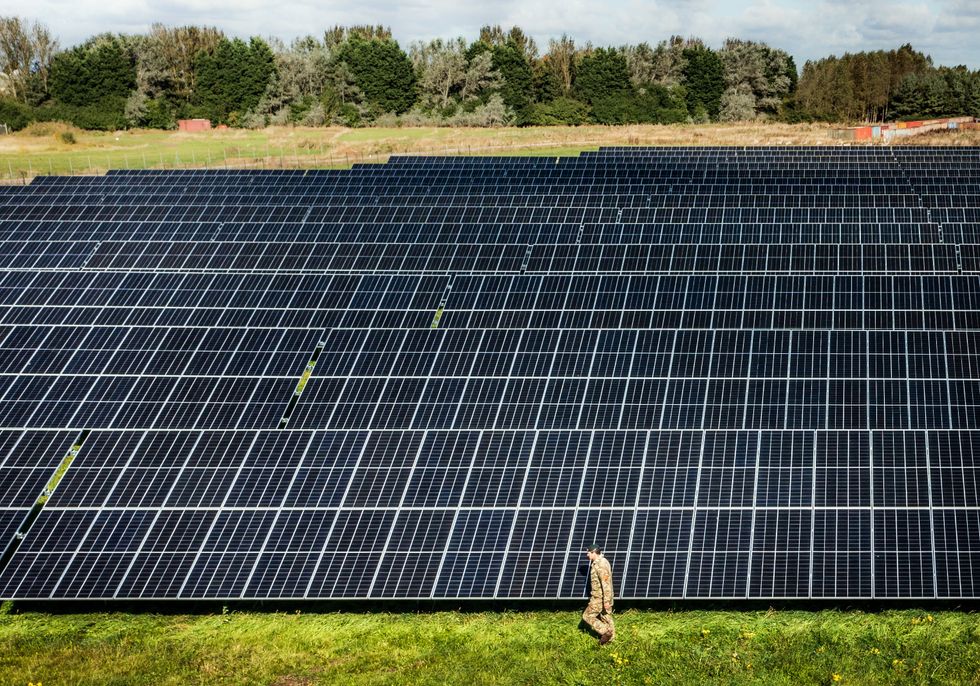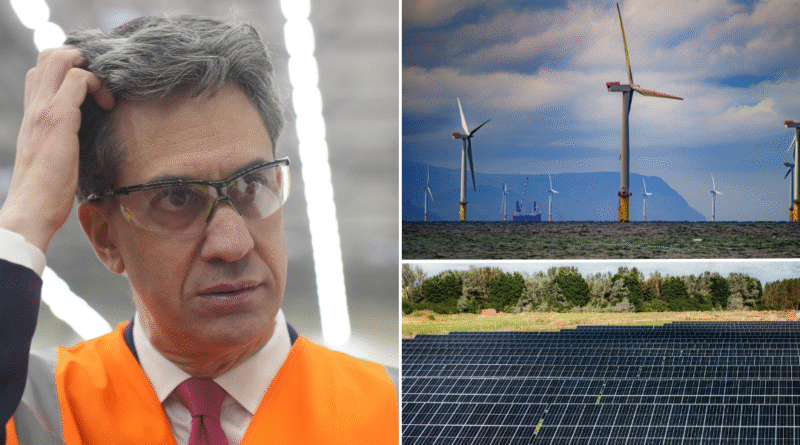Green subsidies cost consumers £25bn
Green energy subsidies are costing consumers £25billion a year — almost half the cost of the entire defence budget, a new report reveals.
The study has blown the lid off what is being described as Britain’s “unsustainable, ludicrous and growing” renewable electricity spending, revealing a £220bn bill to pay for green energy subsidies since 2002.
The authors also say the cost of the tariffs are disproportionately hitting the poorest in some cases.
The research — the first detailed breakdown of its kind, revealed exclusively by GB News — finds British households are unknowingly shelling out the equivalent of £2.5million a day, or £1bn a year, to subsidise renewable energy schemes.

The study has blown the lid off what is being described as Britain’s ‘unsustainable, ludicrous and growing’ renewable electricity spending
PA
This is more than two-and-a-half times the NHS’s total mental health budget, as much as the spend on running and maintaining the UK’s transport network. It is also £7bn more than the spend on every police force in England and Wales combined.
Contrary to repeated government and industry claims that renewable energy is becoming cheaper, the report finds green power is only getting more expensive — with no exit strategy in sight.
The report lays bare the full cost of the UK’s two-decade-long push for ‘green’ electricity, pursued to meet Britain’s legal commitment to Net Zero carbon emissions by 2050 — a target set by a previous Conservative government.
The findings are likely to fuel growing concerns over the cost of Net Zero, recently criticised by Conservative leader Kemi Badenoch, who said it is “impossible” for the UK to meet its 2050 target “without a serious drop in our living standards or by bankrupting us”.
The new analysis, carried out by the Renewable Energy Foundation – REF – a charity that publishes energy data — exposes huge flaws in UK energy policy.
These include a regressive tax hitting the least well-off hardest, stealth charges buried in bills, and complex schemes that benefit wealthy households and major energy developers.
The investigation, conducted by energy experts Dr Lee Moroney and Dr John Constable, reveals annual subsidy bills now topping £25.8bn — equivalent to nearly half of the UK’s entire defence spending.
The authors argue that, despite the huge sums spent, the policies have failed to make green energy cheaper — and are likely contributing to the UK’s economic slowdown.
“This isn’t just a green levy — it’s a stealth tax that’s damaging living standards and productivity,” said Dr Moroney. “The public deserves to know the truth about what’s happening to their money.”
The report identifies 10 different subsidy mechanisms — five direct, five indirect — which together have cost consumers £220bn in today’s prices.
One of the most well-known is the Renewables Obligation (RO), a government scheme introduced in 2002 that forced electricity suppliers to buy a set amount of power from renewable sources, using special certificates (ROCs) to prove it — or face a fine.
Since its launch, the scheme has cost consumers around £90bn, as suppliers passed on the cost through higher energy bills.
LATEST DEVELOPMENTS:

The report lays bare the full cost of the UK’s two-decade-long push for ‘green’ electricity, pursued to meet Britain’s legal commitment to Net Zero carbon emissions by 2050
PA
Another subsidy is the Feed-in Tariff (FiT) scheme. Originally launched to support small-scale rooftop solar panels, critics now refer to it as a “reverse Robin Hood” policy.
Under FiTs, households wealthy enough to afford solar panels could lock in generous payments — while low-income families, particularly renters, were left subsidising them via their bills.
Dr John Constable, director of REF, said: “Subsidies to renewable generators now account for about 40 per cent of the total annual national cost of electricity in the UK, and we have nothing to show for it, except a sharp decline in electricity consumption due to demand destruction.
“This is dangerous and unsustainable. While it is rational to have a climate policy, our policies are clearly not themselves rational. A radical rethink is necessary.”
“This is a state-backed wealth transfer from the poor to the better-off,” said Dr Constable. “It’s regressive, opaque and deeply unfair.”
The report also highlights the Contracts for Difference (CfD) scheme, introduced in 2014. It guarantees renewable energy generators a fixed price, even when market prices fall — with consumers making up the difference.
To date, CfDs have cost around £7.8bn, with costs expected to climb as more large-scale wind and solar projects come online.
On top of these, the report exposes “stealth subsidies” — including constraint payments to wind farms when the grid cannot absorb excess power.
Britain is now paying almost £180,000 an hour — or up to £180m a year — to switch off wind farms when supply exceeds demand.
One of the report’s most damning revelations is the hidden VAT windfall for the Treasury. Because energy bills include VAT, and subsidies push up prices, the government has raked in an estimated £30bn extra in tax since 2002.
This is in addition to rising costs of goods and services, as businesses pass their higher energy bills down the supply chain.

Another subsidy is the Feed-in Tariff (FiT) scheme. Originally launched to support small-scale rooftop solar panels, critics now refer to it as a “reverse Robin Hood” policy
PA
“These aren’t just green energy costs — they’re baked into everything, from the price of your loaf of bread to your train ticket,” said Dr Moroney.
The study found no evidence that green energy is getting cheaper. In fact, the cost per megawatt hour (MWh) of renewable electricity has risen by 50 per cent since 2005, now standing at £200/MWh despite two decades of subsidies.
“This outcome is deeply disappointing,” said Dr Constable. “We’ve spent over £220bn and haven’t achieved the cost reductions we were promised.”
The report links rising subsidy costs to a decline in electricity usage and a weakened economy. UK electricity consumption has fallen by 23 per cent since 2005 — a trend the authors say is driven not by efficiency, but by families and businesses cutting back due to high bills.
“This is not a greener Britain,” said Dr Moroney. “It’s a Britain where people are using less electricity because they simply can’t afford it.”
The researchers believe this energy squeeze is a major — and largely overlooked — factor in Britain’s economic stagnation, slowing productivity, investment, and growth.
Their greatest concern is that the UK’s green energy transition has now become a permanent and unsustainable financial burden — with no clear exit plan.
“The subsidies were supposed to be temporary,” said Dr Constable. “But 20 years on, the costs are rising faster than ever, and the end is nowhere in sight.”
The authors are calling for an urgent cap on green energy subsidies, warning that without reform, annual costs could soon top £30bn.
The Renewable Energy Foundation is now demanding full transparency on green levies, VAT impacts, and the true cost of Net Zero.
It is calling for energy bills to clearly show all renewable charges so households understand where their money is going.
GB News has approached the Government for comment.

